
Viking Names
Sysonby
Sysonby, in the Framland Hundred of Leicestershire, comes from the Old Norse male personal name Sigsteinn (Middle English genitive singular Sigsteines) and Old Norse by ‘a farmstead, a village’.
Read More

Viking Names
Swithland
Swithland, in the West Goscote Hundred of Leicestershire, comes from Old Norse sviðinn ‘land cleared by burning’ and Old Norse lundr ‘a small wood’. Thus the place-name has the meaning of ‘the wood next to or containing land cleared by burning’.
Read More
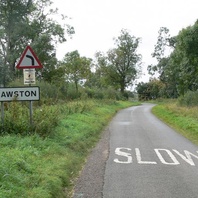
Viking Names
Slawston
Slawston, in the Gartree Hundred of Leicestershire, is an Anglo-Scandinavian hybrid from the Old Norse male personal name Slagr (Middle English genitive singular Slages), which appears to be originally a byname either from slœgr ‘sly, cunning’ or, less likely, from slagr ‘a blow, a stroke’ and the Old English element tun ‘farm, settlement’. This village might have been an Anglian settlement that was appropriated by a Scandinavian from the Viking army which disbanded in the area around 877 rather than a later manorial creation. Slawston is near Blaston, another township with a hybrid Old English/Old Norse place-name which could represent a similar appropriation.
Read More
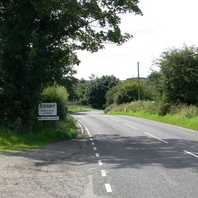
Viking Names
Cosby
The first element of Cosby, in the Guthlaxton Hundred of Leicestershire, is uncertain. It is likely the Old Norse male personal name Kopsi or Kofsi (genitive singular Kofsa) with Kofsa– assimilated to Cossa-. Alternatively the first element could be the Old English male personal name Cos(s)a which appears in such place-names as Cosham, Hampshire, Corsham, Wilshire and Cossington, Leicestershire. The second element is Old Norse by ‘a farmstead, a village’.
Read More
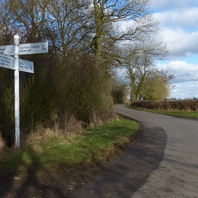
Viking Names
Carlton Curlieu
Carlton Curlieu, in the Gartree Hundred of Leicestershire, is a partly Scandinavianized form of Old English Ceorlenatun, from Old English ceorl (ceorlena genitive plural, Old Norse karl, genitive plural karla) ‘a freeman of the lower class, a peasant’ combined with Old English tun ‘an enclosure; a farmstead; a village; an estate’. The feudal affix Curlieu is the family name of William de Curley who held the manor in 1253.
Read More
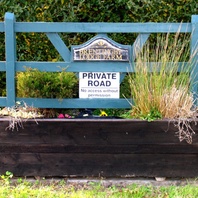
Viking Names
Brentingby
Brentingby, in the Framland Hundred of Leicestershire, is a difficult place-name that presents several problems. It is potentially an Anglo-Scandinavian hybrid from the Old English male personal name Branting or Brenting combined with Old Norse by ‘a farmland, a village’. Alternatively the name could be ‘the by of Brant’s people’ with the Old English –ingas ‘people of’ place-name forming element. However, an Old English folk-name combined with Old Norse by is unusual. Another suggestion is that an early Old English place-name Branting/Brenting, from Old English brant ‘steep’ and the place-name forming suffix –ing, was later compounded with Old Norse by thus ‘the farmstead, village at Branting (‘the steep place’)’. Brentingby stands on a steep slope above the flood-plain of the River Eye.
Read More
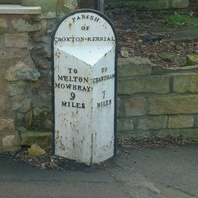
Viking Names
Croxton Kerrial
The first element of Croxton Kerrial, in the Framland Hundred of Leicestershire, likely comes from the Old Danish male personal name Krōk (Old Norse Krókr), originally a byname meaning ‘crooked-back’, possibly ‘crooked-dealer’ related to Old Norse krókr ‘hook’. Alternatively the first element could be Old English crōc ‘a crook’, which relates to a location situated in a nook or bend of land. The second element is Old English tun ‘an enclosure; a farmstead; a village; an estate’. The land was granted to granted to Bertramus de Cryoll in 1239 thus the affix Kerrial. This name can be compared to South Croxton also in Leicestershire.
Read More

Viking Names
Krok
Krókr, an original byname meaning ‘crook-backed’, related to Old Norse krókr ‘hook’, or possibly ‘crooked-dealer’. It is a rare and late personal name in West Scandinavia, but is more common as a byname early. The personal name is also recorded in Sweden and Denmark and is found in a Danish runic inscription as well as in several Danish place-names. Additionally, the name is probably found in Normandy. The name is common throughout the Danelaw and found in many place-names such as South Croxton and Croxton Kerrial in Leicestershire and Croxall, Staffordshire (formerly of the Repton and Gresley Hundred of Derbyshire).
Read More
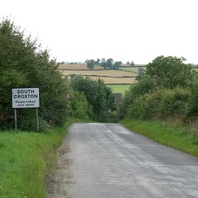
Viking Names
South Croxton
The first element of South Croxton, in the East Goscote Hundred of Leicestershire, likely comes from the Old Danish male personal name Krok (Old Norse Krókr, Middle English genitive singular Crokes), originally a byname meaning ‘crooked-back’, or possibly ‘crooked-dealer’ related to Old Norse krókr ‘hook’. Alternatively the first element could be Old English croc ‘a crook’, that is relating to a location situated in a nook or bend of land. The second element of the place-name is Old English tun ‘an enclosure; a farmstead; a village; an estate’. The Middle English affix suð ‘south’ distinguishes South Croxton from Croxton Kerrial in the Framland Hundred.
Read More

Viking Names
Bark
The Old Norse male personal name Barkr originated as a byname. The name is related to the Old Norse noun bǫrkr (genitive barkar) ‘bark’. One of the settlers of Iceland bore the form Bǫrkr and the name appears as an element in a few Western Scandinavian place-names. Bark is found as a byname in Sweden. Barki is potentially a side-form of Barkr or could be from barki ‘throat’- also a byname. Barkr is the first element in the place-name Barkby, Leicestershire and this place-name was later affixed to Barkby Thorpe, its daughter settlement.
Read More
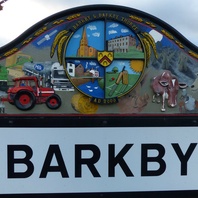
Viking Names
Barkby
Barkby, in the East Goscote Hundred of Leicestershire, is a Scandinavian compound from the Old Norse male personal name Bark, from either Barki (genitive singular Barka), or Barkr, Bǫrkr (genitive singular Barkar) combined with Old Norse by ‘a farmstead, a village’. A late form of the name, Mikeberkby, is prefixed by the Old Norse element mikill ‘great’ to distinguish it from its neighbouring daughter settlement Barkby Thorpe.
